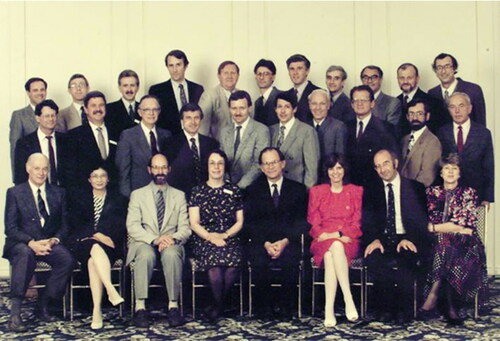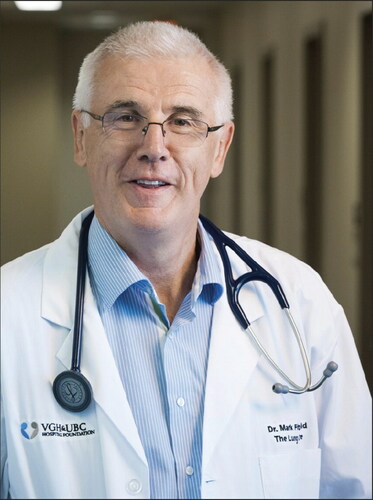Dr. Mark FitzGerald, a giant of the Canadian and international respiratory community, passed away on January 18, 2022, in Vancouver after fighting a battle with cancer for a number of years. Dr FitzGerald was born in Ireland and graduated from the National University of Ireland, campus UCD (university college Dublin), Dublin medical school, in 1978. He initially worked as an internist in Lesotho, South Africa, for two years, then completed post-graduate training in Respiratory Medicine and Clinical Epidemiology at McMaster University. His initial academic appointment was at McMaster in 1987, and he then moved to the University of British Columbia (UBC) in 1989, where he became the director of the Center for Heart and Lung Health at the Vancouver Costal Health Research Institute. This same year, he took part in the first Canadian Asthma Consensus Guideline conference, with a panel of internationally renowned colleagues (). He would subsequently be involved in the development of Canadian asthma guidelines, as Chair and member of the Canadian Thoracic Society (CTS) Asthma Assembly and was the lead author of the 2017 CTS position paper on the recognition and management of severe asthma.
Figure 1. First Canadian Asthma Consensus Guideline panel (1989). Dr. FitzGerald is 7th from the left, in back row. Reproduced with permission.

Dr. FitzGerald was a respiratory physician at The Lung Center, Vancouver General Hospital, with special interest in asthma, COPD, tuberculosis and health outcomes (). Among his other functions, he was Head of the Respiratory Medicine Divisions at UBC and Vancouver General Hospital and was co-Director of the UBC Institute for Heart and Lung Health.
Dr FitzGerald had an immense international reputation for his research and leadership skills. He was a past-Chair of the Global Initiative for Asthma (GINA) Board of Directors and current member of its Science Committee. He led a superb research team, and his work on asthma, health economics, health literacy and patient care was recognized worldwide. He was also the Canadian lead of the International Severe Asthma Registry (ISAR) and contributed to many respiratory societies’ scientific committees. He was one of the leaders of the Canadian Network of Centers of Excellence AllerGen Clinical Investigator Initiative, involved in evaluation of new potentially beneficial asthma medications. He was also a founding member of the Canadian Respiratory Research Network, contributing as member of the Health Economics Platform. Dr. FitzGerald was elected to the Canadian Thoracic Society Executive Committee in 2009 and served as a dynamic and visionary President from 2013-14. He also contributed his expertise as a member of the Editorial Board of this very journal.
Dr. FitzGerald was a prolific clinical investigator. He published more than 600 peer reviewed manuscripts and editorials, often in the most prestigious medical journals. In addition, he was an outstanding communicator and educator with lectures/presentations and contributions to so many medical meetings. In 2019, he received the 2019 CTS Honorary Lecture Award, as a recognition of his impressive contributions to advances in research, education, and clinical excellence in the field of asthma and Canadian respiratory medicine. His lecture, presented at the CHEST Annual Meeting in New Orleans, was titled: “The Evolution of Asthma Care: A 30 Year Perspective”.
Throughout his career, Mark FitzGerald was an extraordinary teacher, clinician, researcher and colleague. Not only was he recognized as a national and international leader in respiratory health, but also as an innovative, passionate, joyful and formidable human being, with a wonderful sense of humor. He made a huge contribution in the last decades, to improve the management of asthma and reduce the burden of this disease worldwide. Notwithstanding such scientific accomplishments, those of us lucky enough to be trained by Dr. FitzGerald know what an exemplary mentor he was. His all-in, passionate support for his students, residents, and fellows made him a sought-after supervisor with his trainees enjoying a long-term era of receiving his mentorship and remaining a collaborator and a friend. His support would continue to extend for early career clinicians or investigators who would benefit not just from his vast knowledge but also from receiving his endorsement at every opportunity. Dr. FitzGerald would not hesitate to put his reputation and credit behind a younger colleague and promote them at national and international levels, and in this way helped to advance careers of many clinicians and scientists who continue cutting-edge care and research.
Many of us have lost a beloved physician and a most appreciated collaborator, colleague, mentor, and friend. Dr FitzGerald has left a legacy that will be long-standing and will inspire our respiratory community for the many years to come. Dr. FitzGerald’s shining personality would brighten the day for those of us lucky enough to interact with him daily. As we grapple with such monumental loss, his motto of “onwards and upwards” when facing setbacks (which happen often in the world of research) should encourage us to follow his legacy of tireless work, generosity, and enthusiasm, toward providing better care for patients with respiratory diseases, and for promoting Canada as an international leader in this field.
Funding
The author(s) reported there is no funding associated with the work featured in this article.

